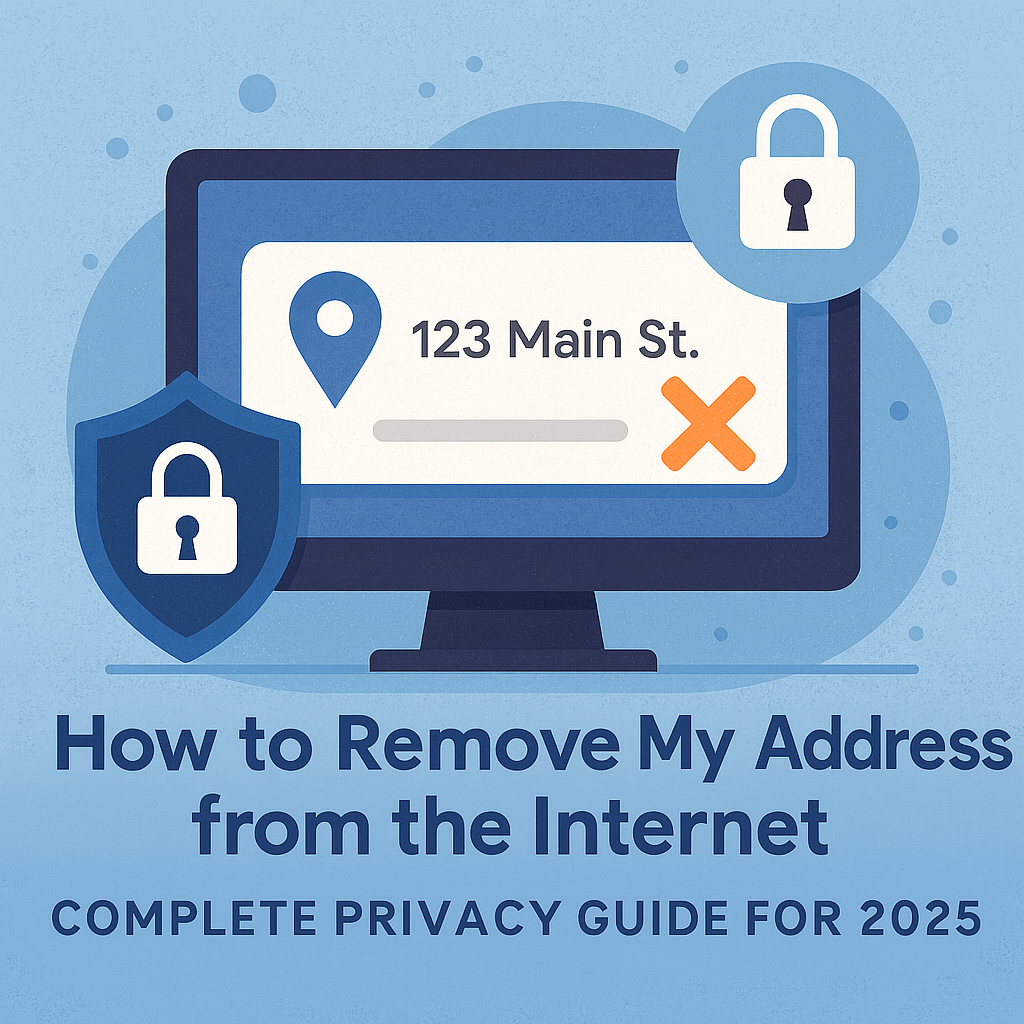Estimated reading time: 5 minutes
Why Your Address Appears Online
Most people are surprised to learn their home address is publicly accessible across dozens of websites. Common sources include:
- Public property records – County assessor and tax databases.
- Voter registration data – Shared with state records.
- Court filings – Civil cases, bankruptcy, or criminal records.
- Data broker websites – Radaris, Spokeo, Whitepages, etc.
- Marketing companies – Lists purchased and resold online.
This means even if you never intentionally shared your address, it may still appear.
Risks of Leaving Your Address Online
- Identity theft – Criminals pair addresses with DOBs and SSNs to commit fraud.
- Harassment and stalking – Ex-partners, strangers, or disgruntled clients may use it maliciously.
- Safety risks – Doxxing makes you vulnerable to unwanted visitors.
- Professional concerns – Employers or clients could see sensitive data.
- Family exposure – Children and relatives at the same address may also be affected.
“Your home should be a safe space. Keeping your address off the internet is a key part of protecting that safety.”
Step-by-Step: How to Remove My Address from the Internet
Step 1: Search for Yourself
- Google your full name + address.
- Note every site showing your home address.
- Copy each URL for record-keeping.
Step 2: Start with Data Brokers
Most addresses are published by data broker sites. Examples include Radaris, PeopleFinder, and NeighborWho.
- Visit the site’s opt out page.
- Provide your name, address, and email.
- Confirm removal through an email link.
Step 3: Remove Cached Copies
Even after removal, Google may still show cached versions of the page. Use:
https://search.google.com/search-console/remove-outdated-content
Steps:
- Submit the page URL.
- Request outdated content removal.
- Check back in 24–72 hours.
Step 4: Opt Out of Public Records Sites
Each state or county has its own rules. Many counties allow you to request redaction of home addresses from property search portals.
Check your county’s assessor, recorder, or tax collector website.
Step 5: Secure Your Social Media
- Remove your phone number and address from Facebook.
- Make LinkedIn private where possible.
- Limit who can see your posts.
Code Block: Quick Opt Out Resources
Google Outdated Content Tool: https://search.google.com/search-console/remove-outdated-content
Opt Out Guide Hub: https://www.privacyrights.org
County Assessor Example: https://assessor.lacounty.gov
Advanced Removal Tactics
File Redaction Requests
Some courts allow individuals to request redaction of addresses from filings. This is especially common for victims of harassment.
Use a P.O. Box or Virtual Address
- Replace your real home address with a USPS P.O. Box or a commercial mailbox service.
- Update registrations, subscriptions, and utility bills to reflect the new address.
Freeze Data Sharing
- Opt out of pre-approved credit card offers at OptOutPrescreen.com.
- Register with the Direct Marketing Association to reduce junk mail.
Why It’s Difficult to Fully Remove Addresses
Even if you request removal, your data may reappear because:
- New property sales trigger fresh uploads.
- Data brokers buy and refresh lists regularly.
- Cached search engines hold onto outdated results.
This is why ongoing monitoring is essential.
Long-Term Privacy Strategies
- Quarterly checks – Search for your name and address every 3 months.
- Google Alerts – Get notified if your address appears online.
- Credit freezes – Protect your finances from identity fraud.
- Professional help – Hire a service like Remove Online Information for continuous suppression.
Case Study
“Linda,” a nurse, found her home address on multiple people-search sites. Despite sending manual opt out requests, her information resurfaced every few months. Partnering with Remove Online Information, she achieved long-term suppression of her address across dozens of data brokers and gained peace of mind.
How Remove Online Information Can Help
DIY efforts are possible but exhausting. Remove Online Information provides:
- Bulk removal across Radaris, Spokeo, Whitepages, and more.
- Suppression of cached results on Google and Bing.
- Continuous monitoring for reappearances.
- Custom solutions for professionals, families, and at-risk individuals.
📌 Protect your address today: Visit Remove Online Information.
FAQ: Removing Your Address from the Internet
Not permanently, but you can suppress it repeatedly through opt outs and monitoring.
Most opt outs are free. Professional services are paid but save time and increase coverage.
Google won’t delete original data, but it removes cached and outdated content.
Most data brokers respond within 7–14 business days.
Not always, but some states allow address redaction for safety reasons (e.g., domestic violence survivors).
Yes. A P.O. Box is one of the safest ways to shield your real location.
Yes. It limits exposure and makes it harder for fraudsters to exploit your data.
Every few months, since brokers refresh their databases regularly.
No. Opt outs have no impact on your financial records.
Hiring a professional removal service like Remove Online Information ensures faster, bulk suppression.
Quick Checklist
- ✅ Search your name + address
- ✅ Collect every URL showing your address
- ✅ Submit opt out requests
- ✅ Remove cached Google copies
- ✅ Secure your social media
- ✅ Replace home address with a P.O. Box
- ✅ Recheck every 3 months
- ✅ Consider professional monitoring
Protecting Your Privacy in 2025
Learning how to remove your address from the internet is essential for safeguarding your family, finances, and reputation. While manual removals help, data re-exposure is common.
By combining opt outs, cache removals, alternative addresses, and professional monitoring with Remove Online Information, you can take control of your privacy in 2025 and beyond.
👉 Start protecting your home address now: Visit Remove Online Information.
Works Cited (MLA Format)
Electronic Frontier Foundation. Surveillance Self-Defense. EFF, 2025, https://ssd.eff.org/.
Federal Trade Commission. Data Brokers and Your Privacy. FTC, 2025, https://www.ftc.gov/.
Google. Remove Outdated Content. Google Support, 2025, https://search.google.com/search-console/remove-outdated-content.
National Conference of State Legislatures. Data Broker Regulation. NCSL, 2025, https://www.ncsl.org/.
U.S. Postal Service. P.O. Box Service. USPS, 2025, https://www.usps.com/manage/po-boxes.htm.

